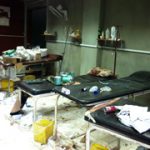As members of the Syrian government, opposition forces, and international actors gather for Geneva II – the latest round of peace negotiations – it is crucial that all parties prioritize the end of systematic violations on medical care and targeted blockades of civilian communities. Attacks on the health community in Syria have been so widespread and systematic that they constitute crimes against humanity. The international community must also press for humanitarian access independent of any political negotiations through a process similar to the chemical weapons inspection agreement.
Throughout the Syrian conflict, government authorities as well as some opposition forces have launched an unprecedented and deliberate assault on medical professionals, facilities, and those in need of care. Health workers have faced arrest, torture, and killings – leading more than half of the country’s medical professionals to flee their homes. These targeted attacks have not only exacted incredible harm on the civilian population, but have also all but destroyed Syria’s national health infrastructure. The ramifications of the Syrian government’s destruction of the country’s health system will last long after the conflict ends.
The conflict has been similarly marked by targeted assaults on civilians, including the purposeful blocking of humanitarian aid, especially to besieged areas. Civilians in these areas have no access to outside assistance, even though the international community has recently publicized its intent to increase humanitarian funding. There must be a negotiated framework that allows humanitarian aid organizations, including the International Committee of the Red Cross and relevant United Nations offices, to access those in need of urgent assistance.
At Physicians for Human Rights (PHR), we are encouraging the international community, led by the United States, the Russian Federation, and the Islamic Republic of Iran, to convene a humanitarian summit and immediately secure an agreement with the government of Syria regarding humanitarian access, similar to the agreement that allows access for United Nations chemical weapons inspectors. With the UN’s withdrawal of an invitation to Geneva II to Iran, a humanitarian summit would also provide the Iranian government with an opportunity to demonstrate its good will and serious intentions to be a credible partner.
The necessary pressure for humanitarian access is of utmost importance and must not fall victim to political dealings. The obligation of states to provide humanitarian assistance to those in need is absolute and non-negotiable. Any negotiations on a political solution to the conflict should not involve humanitarian access, which should move forward no matter what develops on the political front.
Given the extensive and credible evidence of crimes against humanity and war crimes in Syria, including the latest report which provides evidence of systematic torture and killing, the negotiations at Geneva II should not provide amnesties for any alleged perpetrators of international crimes or other serious human rights violations. The peace negotiations this week provide an opportunity to lay the groundwork for a peaceful Syria, which must be built on a foundation of justice and accountability instead of continued criminality and impunity.

